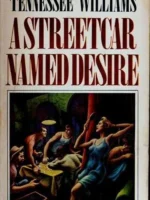Waiting for Godot, Samuel Beckett, 1952
- Author: Samuel Beckett
- Genre: Drama
- Publisher: Grove Press
- Publication Year: 1956
- Pages: 143
- Format: Paperback
- Language: English
- ISBN: 978-0802144423
- Rating: 4,2 ★★★★☆
Waiting for Godot Review
About
Samuel Beckett’s Waiting for Godot (1953) is the defining play of the absurdist movement—a minimalist masterpiece that turns waiting into an existential act. Two men stand beneath a barren tree, speaking, joking, and hoping for a man named Godot who never arrives. Beckett’s brilliance lies in showing how comedy, despair, and meaninglessness coexist in the same breath.
Overview
The play’s setting is stark: a country road, a tree, two men—Vladimir and Estragon. They pass the time through repetitive banter, dreams, and philosophical detours, haunted by the uncertainty of purpose. Beckett’s language is stripped of ornament, his humor bleak but precise. Beneath the surface absurdity lies a profound reflection on time, faith, and the human need for meaning, even when none can be found.
Summary
(light spoilers) Across two acts, Vladimir and Estragon wait for Godot, discussing everything and nothing. They meet Pozzo and Lucky, a master-slave pair whose power dynamic mirrors cruelty and dependence. Each encounter circles back to the same emptiness: Godot will not come, but they will wait again tomorrow. The tree sprouts leaves, but nothing truly changes. Beckett’s genius is in the repetition—the realization that life’s theater repeats itself, absurd and unstoppable. In the silence after the final line, the audience feels the full weight of existence’s loop.
Key Themes / Main Ideas
• The absurd — meaning sought in a meaningless world.
• Time and waiting — existence defined by delay.
• Dependency — companionship as resistance to despair.
• Faith — hope as self-deception and salvation.
• Humanity — laughter surviving the void.
Strengths and Weaknesses
• Strengths — Bold, poetic, hauntingly universal.
• Strengths — Every silence feels deliberate; every word carries weight.
• Weaknesses — Sparse action may alienate traditional audiences.
• Weaknesses — The lack of resolution frustrates those seeking closure.
Reviewed with focus on themes, audience, and takeaways — Samuel Beckett
| pa_author | Samuel Beckett |
|---|---|
| ISBN | 978-3-691-31985-3 |
| pa_year | 1977 |
| Pages | 421 |
| Language | English |







